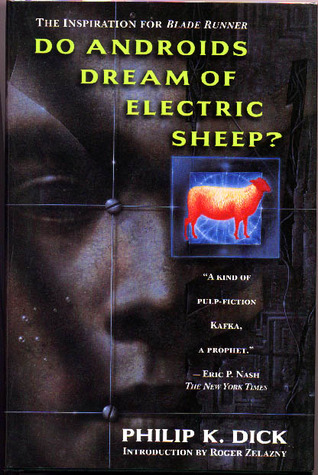A review/reflection of "Do Androids Dream of Electric Sheep?
It is a dangerous thing to recommend any bit of science-fiction
literature to someone who is not a fan. Bad Sci-fi is deadly and can send
anyone running to embrace the eventual onslaught of the robot overlords if they
demand that everyone only read romance novels. Even mediocre sci-fi can turn
the newbie off from the genre as it can be difficult to wrap one’s head around
the notion of aliens who actually settled the Earth eons ago and
we are the aliens. Thus one must be very careful when recommending any sci-fi
to the general public because the side effects can be deadly (those of us who
are enlightened and understand the brilliance of the genre can dive into almost
any sci-fi story and find gems among the garbage, but we are enlightened).
With all of that said, it is with no hesitation that I
recommend Philip K. Dick’s 1968 classic work Do Androids Dream of Electric Sheep? to the wider public. I
recommend it not so much because it creates a fantastic world that we would
aspire to live in (it instead leans towards the dark, dystopian notion of the
future), or because the poetic nature of the writing emulates Shakespeare and
Dante (it doesn’t). Dick’s writing is fine, slightly better than average, but
not brilliant. He doesn’t create a world of hope but more one of despair. I
recommend it because of the questions Dick asks, questions that are very much prevalent
today. Perhaps one of the central questions wonders what it mean to be
human/alive.
First, I don’t recommend you watch Blade Runner as a substitute for this book. While Electric Sheep was the inspiration for Blade Runner the book goes deeper than
the movie with the question of humanity and you do not have to sit through
Harrison Ford’s controlled and stoic acting.
The book starts with the main character, Rick Deckard,
talking to his wife and programing the settings of a “Penfield” to set her mood
and attitude towards life. With this machine you can make someone happy and
willing to please, or moody, or complacent, or satisfied with one’s partner’s
lot in life, and on and on. You can program your mood to whatever you want.
Added to this mechanical mood-setting are androids. Although
they are created in a factory and programed to serve humanity, they have free
will, they have desires and wants, and look to be free from the life they were
slated to live. There are androids that do not want to be servants to humans. Androids
even look like humans when they are cut or killed. They eat and breath and
engage in many ways as humans engage. The more recent incarnation of Battle Star Galactica (2004-2009) embraced
this notion of humanity and machine and plays with the notion well throughout
the series.
What does it mean to be human? On the one hand we have
humans who are living a life of programed emotions and on the other we have
androids who have yearnings and desires to be free. Yet Dick does not stop
there. He introduces us to John Isidore, who is referred to as a “chicken-head”
by others because he has a kind of mental (and maybe physical) defect due to radiation.
He is not treated as fully human and yet he is someone who shows a great amount
of empathy and compassion to humans, androids, and even a spider. There are
other androids who though they have desires to be free do not have empathy or
compassion and rip the legs off of a spider causing Isidore great distress. Without
the empathy, are androids really alive?
Initially Rick Deckard does not feel compassion towards the
androids and questions his humanity when he begins to. To feel for others, to
have compassion might make someone less human? John Isidore has compassion for
all from the begining. Who is fully human?
What does it mean to be human? It is more than just being
flesh and blood. It is more than having desires. It is more than empathy and
compassion. It is all and more or perhaps not. This is what makes Dick’s
writing so good – he does not answer the question. He suggests, he intimates,
he leads the reader to different conclusions, and then lets the reader decide.
If nothing else such a question should lead us to think of our own lives, of
our own relationships, and of the values that are pushed in our society. The
desires that we are fed may not add to our humanity but instead may detract
(like being able to program our mood).
The reader should know that this is not all that Electric Sheep is about. There is the
question of religion and faith, of being alive and seeming alive, and I am sure
other notions to consider. I encourage people to read this book and throughout
to ask themselves what it means to live, to be alive, and to be human.

1 comment:
So I need to take some credit for pushing the book at Jonathan. I knew what the result would be. Some of the best darn Sci Fi ever because the Sci Fi is the background to the nagging questions of life.
Post a Comment